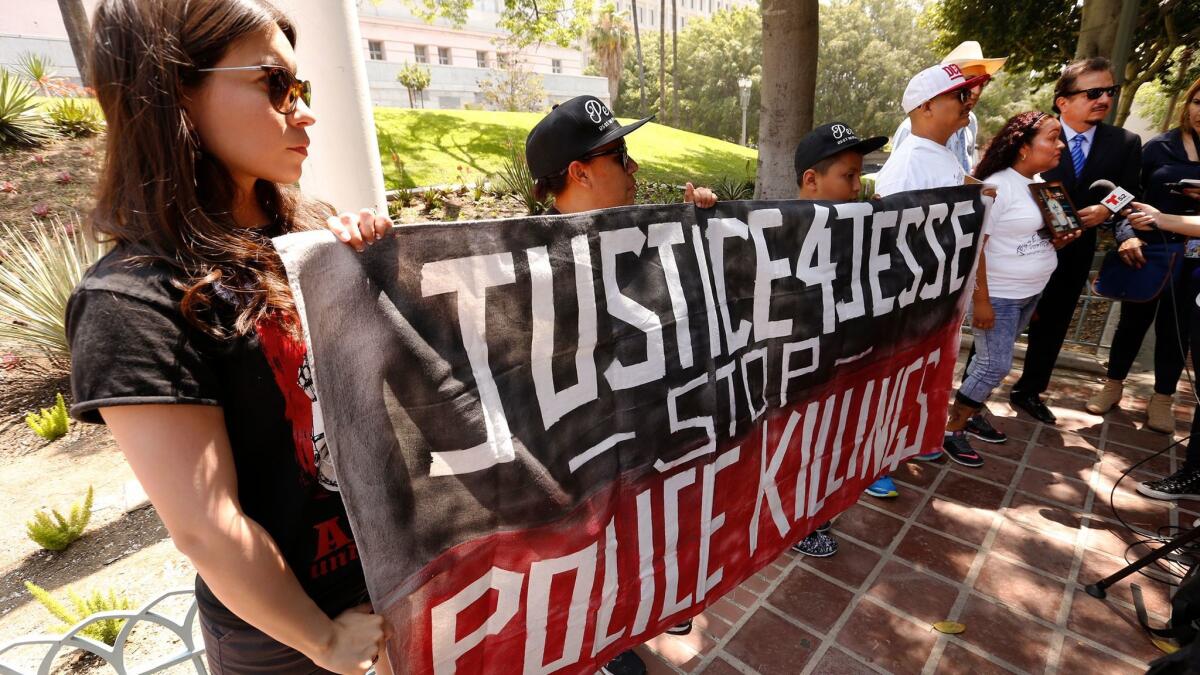No charges for LAPD officer who fatally shot 14-year-old in Boyle Heights, prosecutors say

A Los Angeles police officer won’t be criminally charged in the controversial shooting of Jesse Romero, a 14-year-old boy whose 2016 death inspired protests in his Boyle Heights neighborhood and became part of a broader, often-heated debate over how officers use deadly force.
Los Angeles County prosecutors outlined their reasoning in an 11-page memo made public Monday, saying Officer Eden Medina reasonably believed the teenager posed a deadly threat and used “reasonable force” to defend himself and others.
Central to the controversy surrounding the shooting was whether Jesse fired a revolver at police or whether the gun went off after the teenager tossed it away. After examining and testing the revolver, prosecutors wrote, an investigator said that the “most likely explanation of the evidence was that the revolver was fired, then dropped.”
Witnesses, however, told investigators they saw Jesse throw the gun and heard it fire when it hit the ground, the report said.
The memo included a photo of the scene showing where the gun fell — on the opposite side of a wrought-iron fence and “several feet” away from where the teenager collapsed on the ground.
The boy was one of six people shot by officers in 2016 in the Los Angeles Police Department’s Hollenbeck Division, which patrols the city’s Eastside neighborhoods. Those shootings — the most within any other LAPD division that year — stirred frustration among residents and tested the community relations police had strengthened there.
On Monday, an attorney representing Jesse’s family in a federal civil rights lawsuit said although he believed the evidence strongly supported at least a manslaughter charge, he was not surprised by the lack of charges. It should be up to a jury to decide whether police shootings are lawful but prosecutors don’t give them the chance, attorney Humberto Guizar said.
“I don’t recall the last time [Dist. Atty.] Jackie Lacey’s office has filed criminal charges against a police officer for using deadly force,” Guizar said. “And in cases when they should, they just simply don’t.”
The union representing the LAPD’s rank-and-file backed Medina, saying that officers facing gunfire have an “obligation to not only protect themselves but to protect the public as well.”
Larry Hanna, an attorney representing Medina, said he also believed the officer reacted reasonably after chasing someone who held their waistband and then hearing a gunshot.
”We were not concerned that [prosecutors] were going to file charges,” Hanna said. “I think they did a good job in this case.”
Jesse was with a group of boys tagging graffiti behind a North Chicago Street apartment complex on Aug. 9, 2016, when Medina and his partner responded to a vandalism report at the location.
The boys bolted — Jesse took off down Cesar Chavez Avenue, clutching his waistband as he ran, authorities said. The officers shouted at him to stop, authorities said, but he ignored them.
The officers chased after the boy, who turned onto Breed Street. As they approached the corner, authorities said, they heard a gunshot.
According to a report from LAPD Chief Charlie Beck last year, one officer saw Jesse crouched on the sidewalk, his right arm extended toward them. Thinking Jesse was going to shoot, Medina fired his gun twice, hitting the teenager.
But a woman who said she saw the shooting told The Times that as Jesse ran, she saw him pull a gun from his basketball shorts and throw it toward a fence. The gun hit the fence and fell onto the ground, she said, and she heard the weapon fire.
Three people who saw the shooting from a nearby car told investigators they saw Jesse throw a gun up and toward the fence, the memo from prosecutors said. The gun hit the top of the fence, fell on the sidewalk and “discharged upon impact with the ground,” they added, according to the memo.
Jesse then turned toward the officers, the witnesses said, according to the report. As he did, Medina fired.
Another witness said she saw the teen fire the gun and thought he did so several times, the report said. An analysis of gunshot residue was inconclusive as to whether Romero “had been in the environment of a firearm,” the memo said.
The district attorney’s office concluded that Medina was forced to make a split-second decision in order to end what he perceived as a deadly threat.
“Under the circumstances, it was reasonable for Medina to believe there was significant and imminent danger to himself, to his partner, and to the many people in the vicinity at that time, from an armed man who was refusing to comply with law enforcement,” the district attorney’s memo said.
The Police Commission, which reviews all shootings by LAPD officers, determined in a 3-1 vote last summer that Medina’s use of deadly force fell within LAPD policy but faulted him for some of the tactics he used.
It was the second time in 12 days that Medina had fatally shot someone. He is currently working in the department’s Olympic Division, a department spokesman said.
UPDATES:
5:40 p.m.: This story was updated with comments from attorneys representing Jesse Romero’s family and LAPD Officer Eden Medina, as well as the union representing rank-and-file LAPD officers.
This story was originally published at 4:25 p.m.
More to Read
Sign up for Essential California
The most important California stories and recommendations in your inbox every morning.
You may occasionally receive promotional content from the Los Angeles Times.










